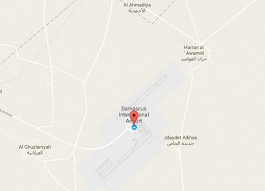
A large explosion hit the area of Damascus International Airport followed by a fire in the same place early on Thursday the Syrian Observatory for Human Rights, a Britain-based war monitor, said.
The massive blast was likely caused by an Israeli air strike said Lebanon’s al-Manar, a television channel affiliated with the Syrian government ally Hezbollah.
A spokeswoman for the Israeli military, asked if Israel had been involved in carrying out air strikes targeting Damascus airport, said: “We can’t comment on such reports.”
The strike hit an arms supply hub operated by Lebanese Hezbollah group near Damascus airport where regular supplies of weapons from Tehran are sent by commercial and military cargo planes, a regional intelligence source has said.
The depot handles a significant amount of weapons that Tehran, a major regional ally of Syrian President Bashar al-Assad, sends regularly by air, the source has said.
The source said the arms depot got a major part of the weapons supplied to an array of Irani-backed militias, led by Hezbollah, which have thousands of fighters engaged in some of the toughest fronts against Syrian rebels.
No human casualties
Al-Manar said initial indications were that the blast had caused only material damage and no human casualties.
Syrian President Bashar al-Assad is backed in the war by Russia, Iran and regional Shi’ite militias including Hezbollah, which is a close ally of Tehran and a sworn enemy of Israel.
Israeli officials have cited any movement of advanced weaponry to Hezbollah units in Syria as a “red line” that has prompted it to carry out air strikes or artillery fire in the past.
Pro-Syrian government media and the Britain-based Syrian Observatory for Human Rights early on Thursday reported a large blast near the airport and a resident of central Damascus, several kilometres (miles) away said it woke her from sleep.
The rebel sources said the attack caused a fire with flames appearing to come from a closed military area of the sprawling complex they believed was used by Tehran to supply weapons to Iranian-backed militias operating alongside the Syrian army

























